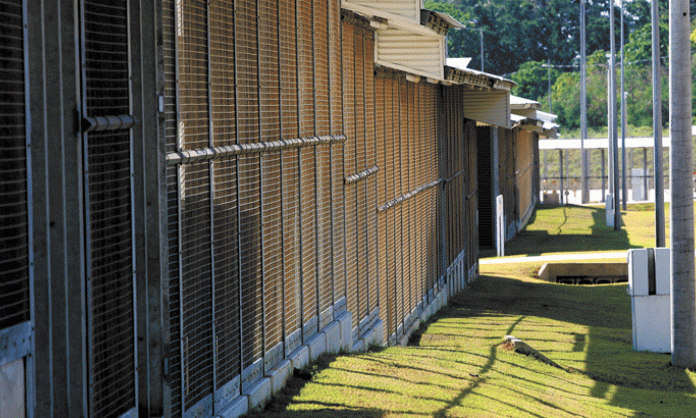Victoria Martin from the Refugee Rights Action Network, Western Australia, speaks to asylum seekers on Christmas Island about recent protests.
A few short weeks ago, this desperate message arrived from a young woman I had been corresponding with in the family camp on Christmas Island:
“It’s a shame it’s a shame.I think you have heared about the protest in some camps on CI [Christmas Island].In the northwest, the single male camp thay have started the hunger strike.
“Some of them have sewed their lips together, some of them harming themselves with glasses and stab wounds on their body, officers couldn’t do anything. they were just standing and watch them”.
She was facing imminent transfer to Nauru, potentially for many years. She fled human rights abuses in her own country, only to face them in mine.
Refugee rights activists will be familiar with the litany of atrocities occurring in the internment camps. Self-harm rates rise to nearly 90 percent after a year in any of the offshore or Serco-run detention camps.
Amnesty International has described the conditions on Manus Island as a violation of the convention against torture. Doctors on Christmas Island have denounced the substandard and life threatening medical “services” provided to refugees.
Serco confirms that asylum seekers as young as 12 have been referred to by boat identification numbers.
Most of the people now on Christmas Island arrived after 19 July, the date the Labor Party as good as withdrew from the refugee convention, decreeing that no asylum seeker who arrived by boat would be settled in Australia.
Those who arrived subsequently are abandoned to a hopeless and abusive future, incarceration and suffering their expected fate.
Is anyone really surprised that desperate people in desperate situations find ways to resist?
A Refugee Rights Action Network advocate translated an interview given to the BBC Persian language service by some of the Iranian detainees in the single men’s camp on Christmas Island. The men said that up to 350 people were protesting inside the camp.
Twelve men had stitched their lips together; nine people tried to kill or cut themselves with blades or glass, and dozens were on hunger strike.
They held up signs saying “Freedom: Azadi”.
They explained to the BBC that the conditions on the island are unhygienic, and International Health and Medical Services provides bad medical care. “The Drs on the island agrees with us, they have wrote a letter to government about this”.
They also spoke of the fear of transfer to Manus Island or Nauru, family separation and their frustration over the non-processing of their cases. “The government tells us you are ‘illegal’. If we are illegal then HOW LONG YOU WANT US STAY HERE!”
At the same time as the Iranian men were giving their interview, my young friend in the family camp told me, “In Aqua,tha family camp thay have started the hunger strike for 2 days and cast slogans of freedom. Last night in our camp(Lilac) we had a meeting and we decided to do something.
“We wrote a letter to immigration and we wanted to give it to them this afternoon.That letter says that:crime is not killing a person,killing hopes and wishes is a crime as well.we have already been told that all of us will be sent to Nauru but let us know how long will it be taken?What will happen eventually for us?”
Detainees have clearly employed other means to be heard. When the government refuses to listen, what is left? Only their own bodies and the scraps of paper upon which they write out their singular need: freedom.
No one understands the importance of freedom more than those who risk their lives to pursue it. Refugees who resist imprisonment should be commended for reminding us that “killing hopes and wishes is a crime”.
Instead, they were abused and threatened: “the day shift boss came and told us with a loud voice and so angry :’It’s disgusting,if you want to sit here ,I wont let the immigration come and see you’.she threatened all men to seperate them from their wives and send them to single male camp” .
Refugee rights activists have always believed in the agency of asylum seekers: their right to determine their fate; their right to resist and protest. The government of Australia must be held accountable for the abuse it perpetrates against these people.
But asylum seekers are not victims. They are survivors who fully appreciate the injustices being done to them.
“Protes was quite respectful without any violence.It is our right to know about our destiny.we don’t know what will happen for us,but if we couldn’t contact you for a while they might have transfered us somewhere cause it’s the same procedure like always.
“They always supressed the protest but nobody knows how. We have some transfering from other camps to our camp,and it seems that tomorrow it will be transferring to Nauru.maybe we both are in the list.. thank you.”
No, my friend: thank you. Thank you for resisting tyranny. Thank you for demonstrating the value of freedom and justice. In defending your rights, you are defending mine. Azadi.








